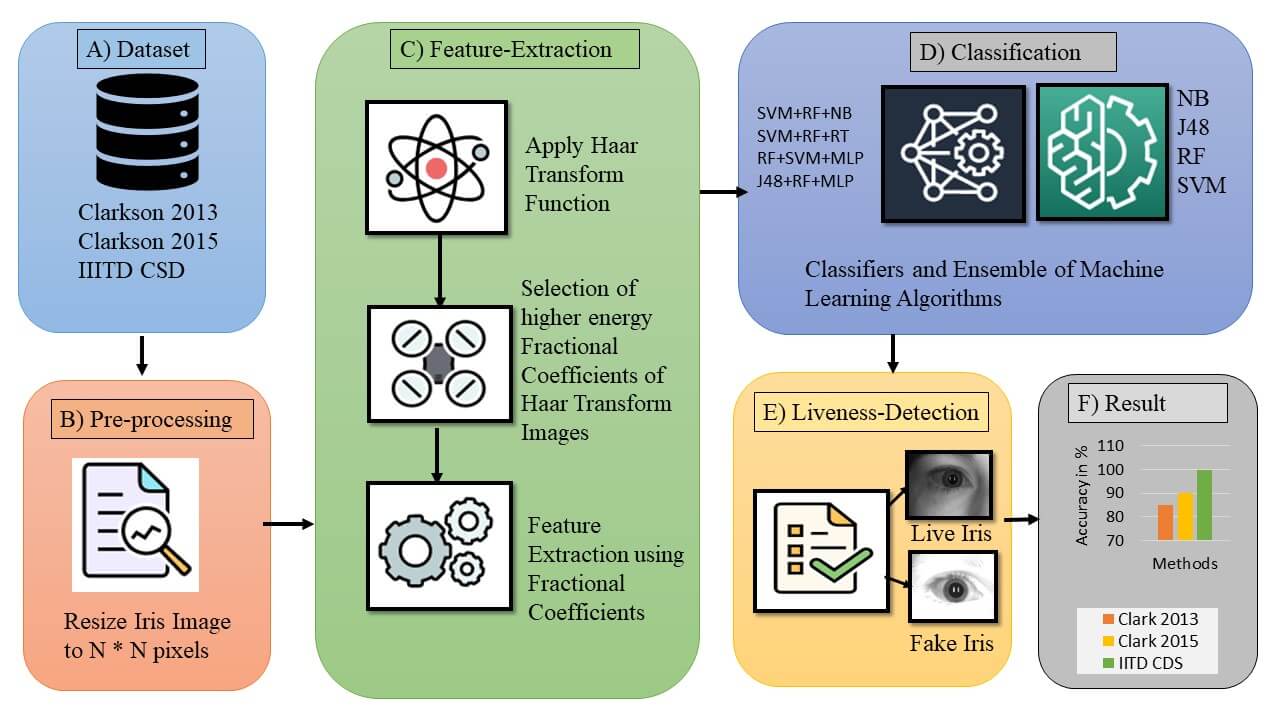 Open Access
Open Access
ARTICLE
Iris Liveness Detection Using Fragmental Energy of Haar Transformed Iris Images Using Ensemble of Machine Learning Classifiers
1 Symbiosis International (Deemed University), Symbiosis Institute of Technology, Pune, 412115, India
2 Symbiosis Centre for Applied Artificial Intelligence, Symbiosis International (Deemed University), Pune, 412115, India
3 Computer Engineering, Pimpri Chinchwad College of Engineering, Pune, 411044, India
4 Centre for Advanced Modelling and Geospatial Information Systems (CAMGIS), School for Civil and Environmental Engineering, Faculty of Engineering and Information Technology, University of Technology Sydney, Sydney, New South Wales, 2007, Australia
5 Earth Observation Center, Institute of Climate Change, University Kebangsaan Malaysia, UKM, Bangi, Selangor, 43600, Malaysia
6 Department of Geology & Geophysics, College of Science, King Saud University, P.O. Box 2455, Riyadh, 11451, Saudi Arabia
* Corresponding Authors: Shilpa Gite. Email: ; Biswajeet Pradhan. Email:
Computer Modeling in Engineering & Sciences 2023, 136(1), 323-345. https://doi.org/10.32604/cmes.2023.023674
Received 09 May 2022; Accepted 13 September 2022; Issue published 05 January 2023
Abstract
Contactless verification is possible with iris biometric identification, which helps prevent infections like COVID-19 from spreading. Biometric systems have grown unsteady and dangerous as a result of spoofing assaults employing contact lenses, replayed the video, and print attacks. The work demonstrates an iris liveness detection approach by utilizing fragmental coefficients of Haar transformed Iris images as signatures to prevent spoofing attacks for the very first time in the identification of iris liveness. Seven assorted feature creation ways are studied in the presented solutions, and these created features are explored for the training of eight distinct machine learning classifiers and ensembles. The predicted iris liveness identification variants are evaluated using recall, F-measure, precision, accuracy, APCER, BPCER, and ACER. Three standard datasets were used in the investigation. The main contribution of our study is achieving a good accuracy of 99.18% with a smaller feature vector. The fragmental coefficients of Haar transformed iris image of size 8 * 8 utilizing random forest algorithm showed superior iris liveness detection with reduced featured vector size (64 features). Random forest gave 99.18% accuracy. Additionally, conduct an extensive experiment on cross datasets for detailed analysis. The results of our experiments show that the iris biometric template is decreased in size to make the proposed framework suitable for algorithmic verification in real-time environments and settings.Graphic Abstract

Keywords
Cite This Article
 Copyright © 2023 The Author(s). Published by Tech Science Press.
Copyright © 2023 The Author(s). Published by Tech Science Press.This work is licensed under a Creative Commons Attribution 4.0 International License , which permits unrestricted use, distribution, and reproduction in any medium, provided the original work is properly cited.


 Submit a Paper
Submit a Paper Propose a Special lssue
Propose a Special lssue View Full Text
View Full Text Download PDF
Download PDF Downloads
Downloads
 Citation Tools
Citation Tools